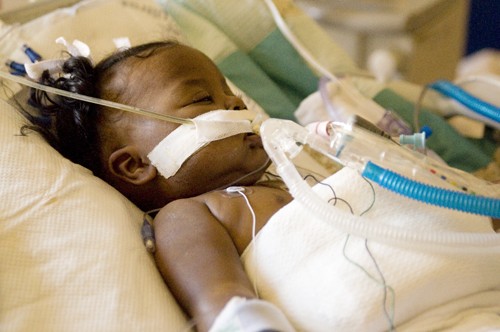A one-year-old Phoenix girl is recovering at University Medical Center after receiving the first three-organ transplant performed in Arizona.
Adrianna Martinez was born Nov. 1, 2008, without a small intestine. During the surgery, which took place on Nov. 9, she was given a small intestine as well as a liver and a pancreas — organs which were needed due to complications surrounding her medical condition. The organs came from an out-of-state, deceased infant donor, said Dr. Rainer Gruessner, professor, head of the Department of Surgery and chief of transplantation at University Medical Center, who was one of several doctors performing the operation.
Adrianna was fed through an IV in her chest for her first year of life because she was not able to digest food. However, this was causing liver failure, increasing the need for a transplant, said Tasha Bowman, Adrianna’s mother.
While Adrianna is still being fed through an IV, Bowman said she is looking forward to when her daughter, “”a strong baby with a lot of attitude,”” can digest her food.
Adrianna’s parents were told there was a problem in the last trimester of the pregnancy, but doctors did not know exactly what it was until after she was born.
“”The last ultrasound she had showed her organs had twisted and not fully formed,”” said Mike Martinez, Adrianna’s father. “”At that point they knew she had a problem with her small intestine, but they didn’t know she didn’t have any small intestines until she was opened up two to three days after she was born.””
Martinez said doctors suggested she could need a transplant but didn’t know if it was possible at the time.
“”About three weeks later one of the doctors contacted us and told us it is possible but we would have to wait at least six months or until she gets to 16-plus pounds because the bigger she got, the easier it would be to do the transplant,”” he said.
Adrianna also has a condition called situs inversus, in which all of the organs in her abdomen were on the wrong side, Gruessner said.
The surgery was originally scheduled after a family friend agreed to donate parts of his organs, but at the last minute a deceased infant donor became available.
“”I’m very thankful to the family that donated their child’s organs,”” Bowman said. “”I know it’s not an easy process. I’m very thankful to the family and the surgeons.””
Gruessner said sometimes it’s necessary to use a living donor if a deceased donor is unavailable because “”50 percent of these children that have that disease die on the (organ) waiting list or are removed because they are too sick. You want to avoid that by doing a living transplant.””
Between 50 and 70 of these three-organ transplants are performed in the U.S. every year and the survival rate is between 65 and 70 percent for the first year, Gruessner said.
Adrianna’s surgery went well, Gruessner said. She will recover in the hospital for the next few weeks while her parents, who work at a call center for financial services, take turns visiting Adrianna each week.
When she gets home she’ll be reunited with her siblings, 11-year-old brother Dominque Martinez and six-year-old sister Raven Bradford.
“”She’s always been a fighter,”” Martinez said. “”That’s one thing myself and her mom have admired about her.””









